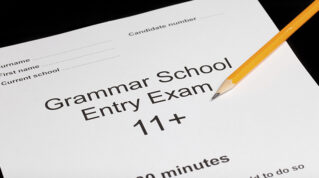Supporters of grammar schools extol their broad and rigorous academic curriculum, their extensive programmes of extra-curricular activities, their warm and strict discipline, their pride in the school and encouragement for pupils to aspire to the top universities and career pathways.
I agree. And I want those things for every child.
Even at their height, grammar schools only educated 19 per cent of the pupil population. That the vast majority did not get into them is a necessary characteristic of grammars, and much more intrinsic than the features above.
That’s why whenever I hear an argument in favour of grammars, I ask the proponent to stop and make the case for secondary moderns first. Because, as Nick Gibb has long pointed out, schools near a grammar de facto become secondary moderns. They teach the pupils who didn’t or couldn’t pass the grammar school entrance test.
I recently visited a primary school in north London. Children from very different homes – 95 per cent of them with EAL – were all learning the same rich knowledge. All year 4 children were being taught about the east African kingdom of Aksum, possibly the first Christian state in the world. So secure were pupils in their knowledge of the Roman empire and the Byzantine empire that they could confidently compare and contrast these with Aksum.
Their first introduction to the word ‘empire’ was in year 3 when they learned about Persia. This understanding was then carefully expanded by the Greco-Persian wars and finally Alexander’s conquest of the Persian empire. They could confidently identify Egypt in the south-west and the Indus Valley in the east of Alexander’s empire.
Why should we become less ambitious for these children when they reach the age of eleven, separating them into those who will continue to have an ambitious curriculum and those who will not?
Levelling down for our children is not a serious option
I taught history for seventeen years in a marvellous state comprehensive school. We educated children whose parents were self-employed plumbers, hairdressers or carpenters, children whose parents were doctors, lawyers, teachers or fellows at Cambridge colleges, and children who came from homes where no one worked. Like many schools, we also taught children who came from homes that presented special challenges.
At no point did it occur to me that any child should not have access to a rigorous history curriculum, learning about Norman England, analysing Elizabeth I’s connections with the wider world or charting India’s road to independence. Why would I have wanted any pupils to have less access to vibrant scholarly debate on Mandela and the anti-apartheid struggle, about Churchill or the Battle of Britain or about the causes of the Holocaust?
It did not occur to me that some children shouldnot have access to our First World War battlefields trip. Or that some children should not learn to play an instrument, or sing the music of Thomas Tallis, or play sport, or take an active part in the Duke of Edinburgh’s award or wear their uniform with pride.
For all these reasons and more, I am opposed to any policy that would see a return to a selective system. For those who say it is all about parental choice, I say this: no parent chooses to send his or her child to a grammar school. The grammar school chooses the children, and the vast majority will be rejected. Levelling down for our children is not a serious option.
We now have a mixed economy of schools. Some are part of a local authority; others are academies; others are non-selective free schools. Remarkable work takes place in all these schools, teaching all pupils from all backgrounds.
So I have added my name to a new group, Times’s Up for the Test (TUFTT), because even to discuss a return to a selective grammar school system is a huge distraction from our proper priority of improving all schools for all children.
Indeed we need to go further. I would like to see an end to selective education where it still takes place in the state sector. With growing, cross-party support, I believe we could soon see an end to the secondary modern and an ambitious, broad education for all our children.
















Your thoughts